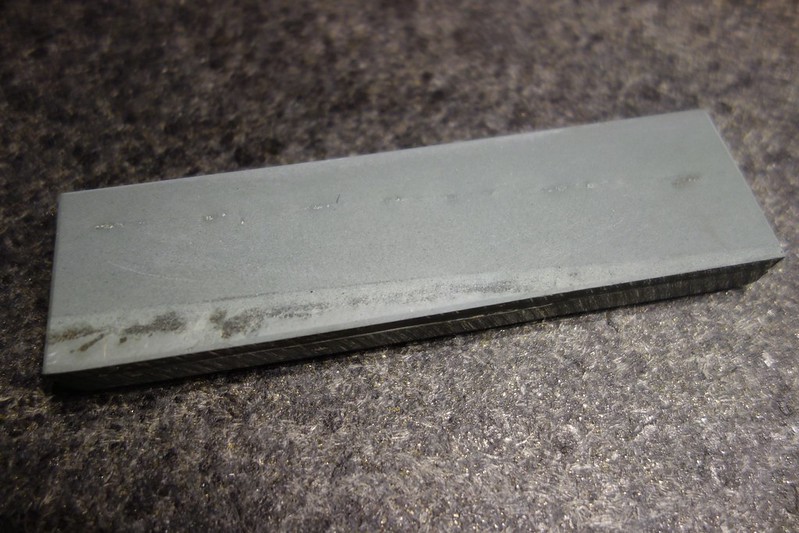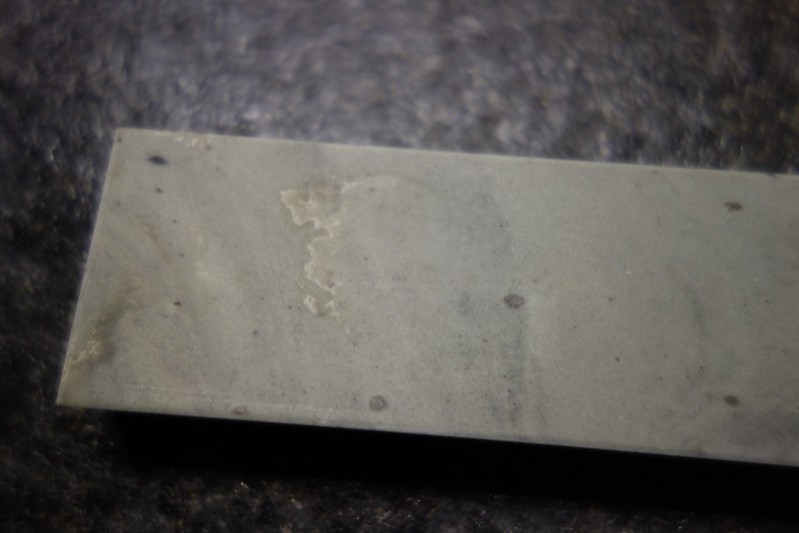Results 1 to 10 of 16
Hybrid View
-
06-14-2015, 12:53 AM #1
 Help! Identify Unknown Mystery Finisher
Help! Identify Unknown Mystery Finisher
I have been following SRP for awhile but finally made an account as I have a question, Thanks for looking!
Here is a hone I picked up in a Southern Missouri antique shop for $5 dollars. Looking at the surface through a loop it looks very similar to a hard Arkansas of mine, grey surface with black speckles. Although, this mystery stone seems to have formed in layers, kinda of like slate. Novaculite doesn't form in layers as far as I'm aware, so I don't believe the hone in question is from Arkansas (google "raw novaculite"). When lapping it with a dmt 325 it feels softer and is a lot easier to create a slurry with the dmt, compared to the ark. (the ark is in the photos with the blue label on the side stating "norton" and bear of course). I have taken several razors to the 8k level then brought it to the mystery stone and it definitely improves and 8k edge. It smooths it out some, but mainly increases the sharpness to around 10k-11k. the slurry is more like a soft white talc when dry. check the pics, let me know what you think!
Last edited by StoneSeeker; 06-14-2015 at 01:03 AM.
-
06-14-2015, 01:35 AM #2Senior Member

- Join Date
- Sep 2013
- Location
- NW Indiana
- Posts
- 1,060
Thanked: 246
Looks like a Japanese natural stone to me. Definitely not novaculite. You'll know when you're lapping an Ark.
-
The Following User Says Thank You to eKretz For This Useful Post:
StoneSeeker (06-14-2015)
-
06-14-2015, 11:51 AM #3Senior Member

- Join Date
- Feb 2014
- Location
- Eindhoven, The Netherlands
- Posts
- 235
Thanked: 24
definatly a nice looking hone you've got there, how soft is it? does it autoslurry when honing?
I have no idea but the Jnat option seems reasonable since it has some of the outer shell on it....
-
The Following User Says Thank You to Bram For This Useful Post:
StoneSeeker (06-14-2015)
-
06-14-2015, 01:13 PM #4

Looks like a J-nat to me too. How many passes with steel before the slurry starts to darken? Who knows (or cares) what mine it may have come from, so long as it works good. Congratulations thanks for showing.
Mike
-
The Following User Says Thank You to MODINE For This Useful Post:
StoneSeeker (06-14-2015)
-
06-14-2015, 03:42 PM #5

If it's not a Japanese natural stone, it could be one of the British Llyn Idwal or Grecian type of stone. They vary in hardness, and from the looks of the stone and slurry I think it's the British kind.
Also, there are many types of novaculite. The Arkansas stones are hard, but not all novaculite types are that hard.
-
The Following User Says Thank You to Vasilis For This Useful Post:
StoneSeeker (06-14-2015)
-
06-14-2015, 03:50 PM #6
-
The Following User Says Thank You to doorsch For This Useful Post:
StoneSeeker (06-14-2015)


 13Likes
13Likes LinkBack URL
LinkBack URL About LinkBacks
About LinkBacks







 Reply With Quote
Reply With Quote


